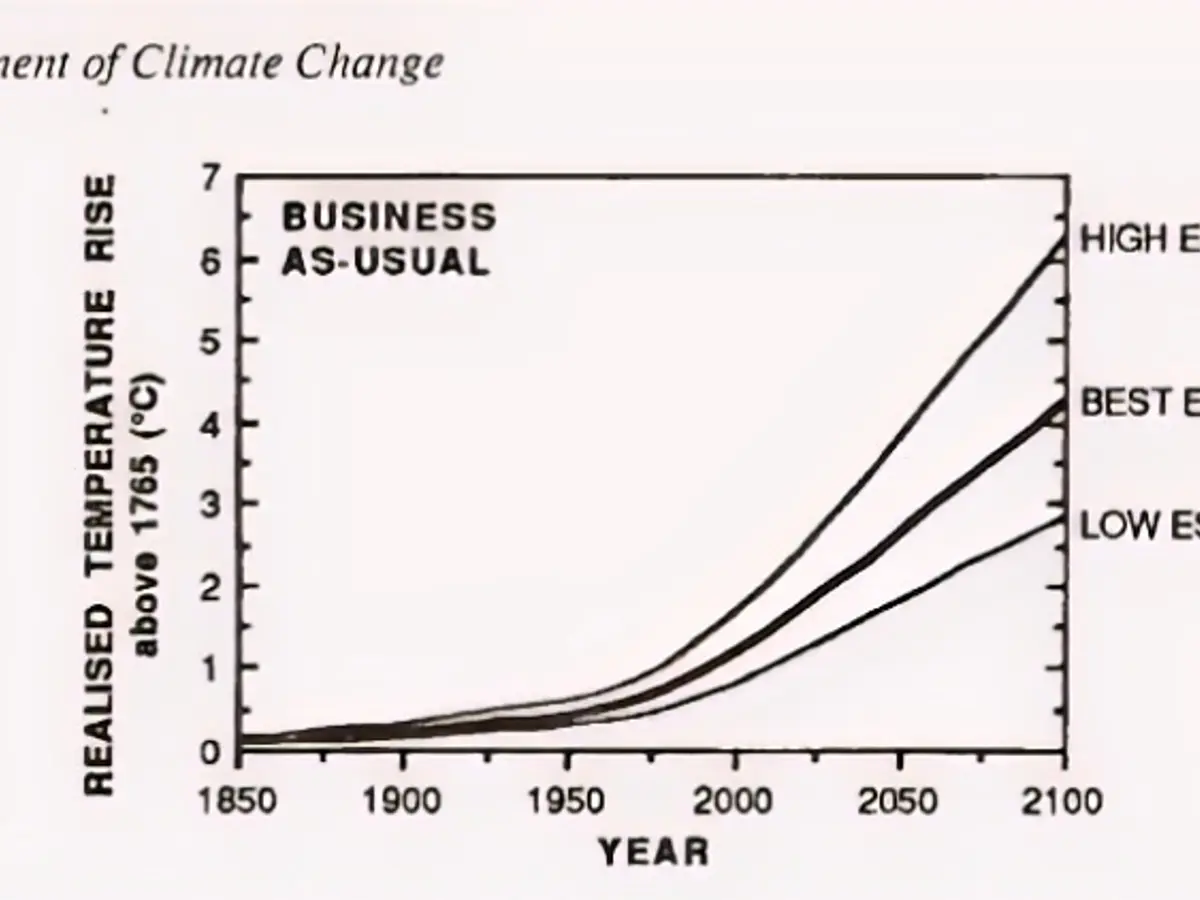Facts about climate change that everyone should know
Some deny climate change, others do not believe it is man-made, many do not understand the consequences. Six organizations have therefore summarized the facts that are undisputed among scientists in an easily understandable, brief and concise manner. The paper helps to understand and explain.
Because they are so loud and receive a disproportionate amount of attention, you might think that many people are in denial about climate change. But this is not the case. A Eurobarometer survey conducted by the EU Commission last July revealed that 93% of Europeans consider climate change to be a serious problem for the world. In Germany, 89 percent of the population share this opinion.
There is less agreement on the question of how to tackle the problem. 60 percent of Germans and 58 percent of Europeans believe that the transition to a green economy should be accelerated. 73% of European citizens estimate that the cost of the damage caused by climate change is higher than the investment required for the green transition.
Material for fact-based discussion
It is important that the discussion on how to deal with the climate crisis is fact-based. The German Climate Consortium, the German Meteorological Society, the German Weather Service, the Hamburg Extreme Weather Congress, the Helmholtz Climate Initiative and klimafakten.de have therefore published a paper on what is now undisputed knowledge in climate research.
In less than 30 pages,"What we know about the climate today" summarizes the basics in an easily understandable way, explains the global significance and consequences of climate change in Germany and outlines possible future developments. The sources are documented and easy to read.
Climate change cannot be explained without greenhouse gases
First of all, it deals with the argument often put forward against climate measures that climate change is not man-made. According to the authors of the paper, warm and cold periods have so far mainly been caused by changes in the Earth's orbit around the sun or shifts in continents or the Earth's axis of rotation. Temperatures did not fall or rise within decades. The shortest Earth orbit parameter cycle, for example, lasted 23,000 years.
Air samples from ice cores dating back up to 800,000 years have shown that historical climate fluctuations can only be explained if the concentration of gases responsible for the greenhouse effect in the atmosphere is taken into account. It has been increasing rapidly since the beginning of industrialization at the end of the 18th century. In 2022, it was 50 percent higher than before the start of industrialization, and two and a half times higher for methane.
Global warming primarily means that the oceans are warming, absorbing 91 percent of the additional energy caused by climate change. 5 percent is absorbed by the continents and 2.7 percent by the ice masses. Only 1.3 percent remains in our planet's atmosphere, which is why the temperature of the atmosphere can stagnate or even decrease.
Models were right and are getting better and better
Climate research models are often doubted under the motto "It won't be that bad". However, they have been used for over 30 years, which allows us to assess their accuracy in retrospect. The result: the global temperature rise today is exactly within the fluctuation range that the Intergovernmental Panel on Climate Change (IPCC) expected in its first assessment report in 1990.

Climate models that depict the consequences of global warming are far more complicated. The development of precipitation in particular is difficult, the paper states: Where will it get drier? Where will it get wetter? And how much? But with today's computing power and more and better measurements, it is increasingly possible to predict what is likely to happen in different scenarios.
Here too, a look into the past helps. Modern climate models can accurately depict observed developments in the past. "Therefore, conclusions for possible future climate development that we can draw today from the results of model calculations are a reliable basis for political decisions," say the authors of the paper.
Every decade since 1980 warmer than the previous one
The cooling of the subpolar Atlantic, which at first glance seems to contradict the general global warming, was also correctly predicted. It is apparently due to a weakening of the Gulf Stream system. However, a slight cooling in the Southern Ocean is still unexplained.
Otherwise, the Earth's surface is getting warmer all the time; on a global average, the temperature has already risen by more than 1.1 degrees compared to pre-industrial times. Since the 1980s, every decade has been warmer than the previous one and warmer than all previous decades since 1850.
All ten warmest years since records began have occurred since 2005. According to data from the US agency NOAA, 2022 was the 46th consecutive year worldwide in which mean temperatures at the Earth's surface were above the 20th century average.
The ice is melting, sea levels are rising
Climate change can also be impressively observed in the Arctic ice. Since satellite measurements began in 1979, its area has been shrinking by an average of more than ten percent per decade. On Greenland, too, the decline in ice mass is dramatic and accelerating, shrinking by more than 278 billion tons every year.
The water released in the Arctic has increased the average global sea level by seven millimeters per decade since 2006. The melting of the Antarctic ice sheet contributes four millimetres per decade. Between 1880 and 2020, the global average sea level has already risen by around 20 centimetres. Mountain glaciers are also melting rapidly, with an average ice sheet more than 20 meters thick disappearing since 1980.
It is also undeniable that extreme weather events are increasing and becoming more likely worldwide as a result of climate change. These include heatwaves and droughts, but also heavy rainfall and flooding, and the intensity of tropical cyclones is increasing. In addition to the immediate damage, weather extremes have other serious consequences, including a threat to food supplies in some regions of the world.
Germany already 2.1 degrees warmer
The paper also clearly summarizes the consequences of climate change for Germany, where temperatures have risen more than the global average. According to data from the German Weather Service, the past ten years have been around 2.1 degrees warmer than the first three decades (1881-1910) of records.
And the pace of warming has increased significantly in recent years; since the 1960s, every decade in Germany has been significantly warmer than the previous one. Nine of the ten warmest years in Germany since 1881 occurred after 2000. Eight years were already more than 2 degrees warmer than the long-term average, five years even 2.5 degrees or more.
The number of hot days with temperatures above 30 degrees has increased from an average of 3.5 to almost nine per year in Germany since the 1950s. In some years it can be significantly more. In the same period, the number of ice days with permafrost fell from 28 to 19 days. If greenhouse gas emissions continue unabated, a further increase of five to ten hot days in northern Germany and ten to 15 in southern Germany is expected for the period 2021 to 2050.
More frequent heavy rainfall and droughts
The data series is still too short to make a reliable forecast, but it is likely that there will be more heavy rainfall events in Germany, while droughts will occur more frequently at the same time. It is remarkable "that the dry years 2018 to 2020 were unprecedented for the past 250 years", the paper states. "There has not been a three-year summer drought of this magnitude in Central Europe since 1766." The trend continued in many regions in 2022.
According to data from the Helmholtz Center for Environmental Research in Leipzig, large parts of Germany have experienced the sixth consecutive dry year with a drought during the growing season. This has affected not only agriculture, animals and plants, but also inland shipping and thus industrial supply chains. Low water levels also meant that power plants had to reduce their output due to a lack of cooling water.
Every tenth of a degree counts
The authors believe that the Paris Climate Agreement's goal of limiting global warming to no more than 1.5 degrees, but definitely well below 2 degrees, is hardly achievable. According to the current political targets, there would still be an increase of around 3 degrees by the end of the century, they write. If all previous pledges are met, 2 degrees would be achievable at best.
However, they point out at the end of the paper that significant reductions in emissions are possible and that every tenth of a degree counts. For example, a storm surge, which statistically occurs every 500 years on the North Sea coast near Cuxhaven, could occur once every hundred years with 1.5 degrees of warming, and every 33 years with 2 degrees.
Read also:
- This will change in December
- Attacks on ships in the Red Sea: shipping companies avoid important trade route
- Houthi rebels want to launch further attacks despite international coalition
- USA forms military coalition against Houthi attacks on ships in the Red Sea
In light of the Eurobarometer survey, it's evident that the majority of Europeans and Germans are concerned about climate change, recognizing it as a serious global issue. This concern is reflected in their belief that efforts should be made to accelerate the transition to a green economy, considering the estimated cost of climate change damages to be higher than the investment required for the green transition.
The report published by six organizations, including the German Climate Consortium, aims to provide fact-based information about climate change, including undisputed knowledge about its causes, consequences, and potential future developments. According to the report, historical climate fluctuations can only be explained if the concentration of greenhouse gases in the atmosphere is taken into account, and global warming is primarily causing the oceans to warm, absorbing over 90% of the additional energy caused by climate change.
Source: www.ntv.de







